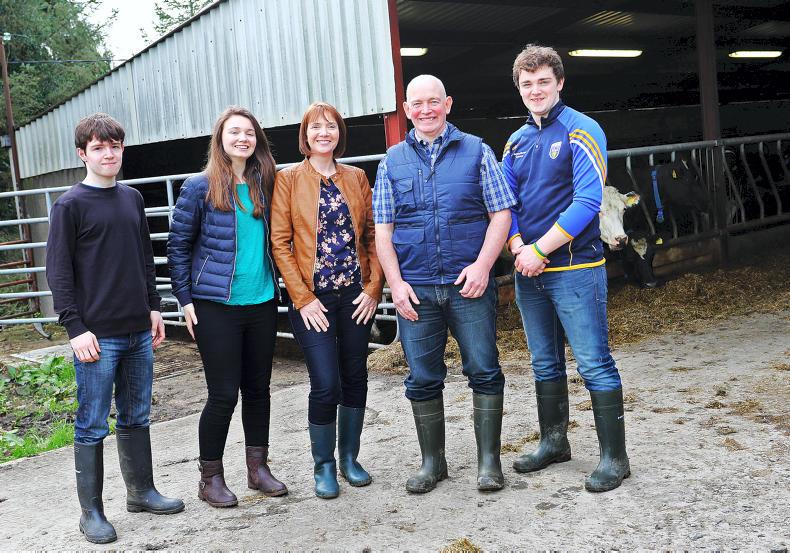It’s fair to say Big Week on the Farm is like Marmite – some people love it, some people hate it.
Billed as a week-long entertaining insight into the workings of a real-life dairy farm, the series has polarised opinion among farming viewers.
Some say it’s dumbed down and bears no relation to real commercial farming life, while others happily gathered their families round the TV each night last week to see what was happening on the Shalvey homestead.
Some say it’s dumbed down and bears no relation to real commercial farming life
I fall somewhere in the middle.
The science and ‘‘secret life’’ segments were a super insight, albeit too brief, into subjects as varied as drone technology, a bull’s first breeding season and a dairy sheep farm. The dissection of a cow’s stomach (complete with plenty of rumen fluke) caused many a viewer to gag over their supper.
On the flip side, the cringe-factor was off the scale on the regular ‘‘Pull the Udder One’’ slot, in which celebrities proved they would unlikely be knocking on the door of FRS for a relief milking job.
But let’s not forget, this programme is not aimed at the dairy woman who knows what weighting maternal traits have on the EBI index. Nor is it aimed at the beef man who knows what carcase weight he needs from each heifer to make a profit.
This is fact-based entertainment aimed at the predominantly urban viewer – the people who buy their milk in a carton and their steak in a shrink-wrapped box from the supermarket.
Giving those people, who indirectly support every single farmer in Ireland, an insight, an attachment and maybe even a grá for farming is an overwhelmingly positive move for our industry.

Patrick Shalvey, whose farm is both a commercial operation and a wildlife haven, is a superb ambassador for Irish agriculture and his family’s love of the land and affinity with their animals and nature was clear to see.
Dairy farmers in New Zealand are currently fighting a pitched battle against environmental activists who claim “Dairy is dirty”. They would give their right arm to have a farming programme aired on mainstream terrestrial TV.
Similarly, farmers all over the world facing an onslaught from the anti-farming vegan lobby can only dream of having a positive farming story told at prime viewing time.
Huge audience
Early viewing figures from RTÉ show that Big Week on the Farm attracted an average audience of 325,000 people for the first four episodes and an audience share of 28%.
If Irish agriculture had to pay cash for advertising to reach those TV viewers, it would cost a fortune.
If the anti-farming lobby groups were offered similar week-long exposure for their cause, make no mistake, they would jump at the opportunity.
Farmer writes: defending farming from mistruths
We cannot afford to take public perception for granted
It’s fair to say Big Week on the Farm is like Marmite – some people love it, some people hate it.
Billed as a week-long entertaining insight into the workings of a real-life dairy farm, the series has polarised opinion among farming viewers.
Some say it’s dumbed down and bears no relation to real commercial farming life, while others happily gathered their families round the TV each night last week to see what was happening on the Shalvey homestead.
Some say it’s dumbed down and bears no relation to real commercial farming life
I fall somewhere in the middle.
The science and ‘‘secret life’’ segments were a super insight, albeit too brief, into subjects as varied as drone technology, a bull’s first breeding season and a dairy sheep farm. The dissection of a cow’s stomach (complete with plenty of rumen fluke) caused many a viewer to gag over their supper.
On the flip side, the cringe-factor was off the scale on the regular ‘‘Pull the Udder One’’ slot, in which celebrities proved they would unlikely be knocking on the door of FRS for a relief milking job.
But let’s not forget, this programme is not aimed at the dairy woman who knows what weighting maternal traits have on the EBI index. Nor is it aimed at the beef man who knows what carcase weight he needs from each heifer to make a profit.
This is fact-based entertainment aimed at the predominantly urban viewer – the people who buy their milk in a carton and their steak in a shrink-wrapped box from the supermarket.
Giving those people, who indirectly support every single farmer in Ireland, an insight, an attachment and maybe even a grá for farming is an overwhelmingly positive move for our industry.

Patrick Shalvey, whose farm is both a commercial operation and a wildlife haven, is a superb ambassador for Irish agriculture and his family’s love of the land and affinity with their animals and nature was clear to see.
Dairy farmers in New Zealand are currently fighting a pitched battle against environmental activists who claim “Dairy is dirty”. They would give their right arm to have a farming programme aired on mainstream terrestrial TV.
Similarly, farmers all over the world facing an onslaught from the anti-farming vegan lobby can only dream of having a positive farming story told at prime viewing time.
Huge audience
Early viewing figures from RTÉ show that Big Week on the Farm attracted an average audience of 325,000 people for the first four episodes and an audience share of 28%.
If Irish agriculture had to pay cash for advertising to reach those TV viewers, it would cost a fortune.
If the anti-farming lobby groups were offered similar week-long exposure for their cause, make no mistake, they would jump at the opportunity.
Farmer writes: defending farming from mistruths
We cannot afford to take public perception for granted







 This is a subscriber-only article
This is a subscriber-only article











SHARING OPTIONS: